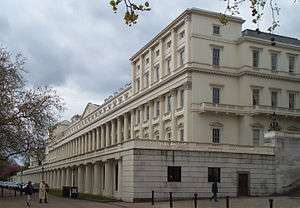Turf Club (gentlemen's club)
|
Carlton House Terrace, from the Mall | |
| Formation | 1861 |
|---|---|
| Type | Gentlemen's club |
| Location | |
| Coordinates | 51°30′21″N 0°07′58″W / 51.505940°N 0.132795°WCoordinates: 51°30′21″N 0°07′58″W / 51.505940°N 0.132795°W |
The Turf Club is a London gentlemen's club, established in 1861 as the Arlington Club. It is currently located at 5, Carlton House Terrace.
History
The Turf Club was founded in 1861 as the Arlington Club, with premises in Bennett Street, Piccadilly.[1] It was while there that a committee of the Arlington, consisting of George Bentinck, Sir Rainald Knightley, Charles C. Greville, H. B. Mayne, John Bushe, G. Payne, and Colonel Pipon, under the chairmanship of John Clay MP, drew up the laws of whist, officially sanctioned by the Portland Club in 1864.[2]
Members had originally wished to call themselves simply The Club until it was discovered that they had been beaten to it: a hundred years or so earlier the name had been claimed by Dr Johnson and Sir Joshua Reynolds for their renowned dining society.
The Turf Club moved in 1875 to the corner of Piccadilly and Clarges Street. The new building at 85 Piccadilly, designed by John Norton,[3] remained the clubhouse for ninety years until the Club decided to sell the extremely valuable freehold.[4]
In 1965, the Turf Club moved to its current home at 5 Carlton House Terrace, SW1Y 5AQ, overlooking the Mall. Carlton House Terrace itself was designed and built by John Nash, the famous Regency architect, between 1827 and 1833. The lease on Number 5 was held by the Earls of Caledon from 1830 until 1929, and its residents included Lord Palmerston; John Hay, the U.S. Ambassador; Emerald, Lady Cunard (mother of Nancy Cunard); and Harry Gordon Selfridge, founder of Selfridges.[5]
Some quotations about this English aristocratic bastion include:
- "There are . . . few members who are not of particularly blue blood who have succeeded in passing the portals of the Turf Club, which is a pretty close preserve for the aristocracy." [1904] [6]
- "Probably the most exclusive club in London." [1911] [1]
- "Socially it was extremely pleasant, the majority of the members being principally engaged in amusing themselves." [1920] [7]
- "At the turn of the [Twentieth] century, when many clubs were forced to admit a wider range of members, the Turf remained notably exclusive. It has always been particularly well off for Dukes." [1979] [4]
- "It is the most beautiful gentlemen's club in London and has the youngest membership." [1984] [9]
In December 2008, it was reported by the Daily Mail that the Princes William and Harry, sons of the Prince of Wales, had been given membership to the 'patrician haunt'. In the same article it was written that the annual members' fee was £1,000.[10]
Notable members
To view a list of current members see, List of Turf Club members
See also
References
- Sources consulted
- Lejeune, Anthony (1979). The Gentlemen's Clubs of London. London: Macdonald and Jane's. ISBN 0-354-08504-2.
- Nevill, Ralph (1969) [1911]. London Clubs: Their History and Treasures. London: Chatto and Windus. ISBN 0-7011-1520-3.
- Endnotes
- 1 2 Nevill, op. cit., p. 218
- ↑ Nevill, op. cit., p. 181
- ↑ Dictionary of National Biography, Second Supplement. III (facsimile ed.). London: Smith, Elder, & Co. 2006 [1912]. p. 27. ISBN 0-543-88107-5.
- 1 2 Lejeune, op. cit., p. 273
- ↑ Gater, G.H. (1940). "9: Carlton House Terrace and Carlton Gardens". In Hiorns, F.R. Survey of London. 20: St Martin-in-the-Fields, pt III: Trafalgar Square & Neighbourhood. pp. 77–87. Retrieved 6 January 2011.
- ↑ Nelidoff, Serge (April 1904), "Characteristics of London Clubs", The English Illustrated Magazine, London: Hutchinson & Co., 31 (new series) (April 1904), p. 5
- ↑ Fortescue, Captain the Hon. Seymour John, R.N. (1920). Looking Back. London: Longmans, Green and Co. p. 188.
- ↑ Lejeune, op. cit., p. 7
- ↑ Theodoracopulos, Taki (1984). Princes, Playboys & High Class Tarts. Princeton: Karz-Cohl Publishers. p. 17. ISBN 0-943828-61-9.
- ↑ Kay, Richard (4 December 2008). "Princes Go to Ground at the Turf Club". Daily Mail. Retrieved 22 May 2013.
External links
- Turf Club.co.uk – official website (now shut down, as the members "don't want it")
